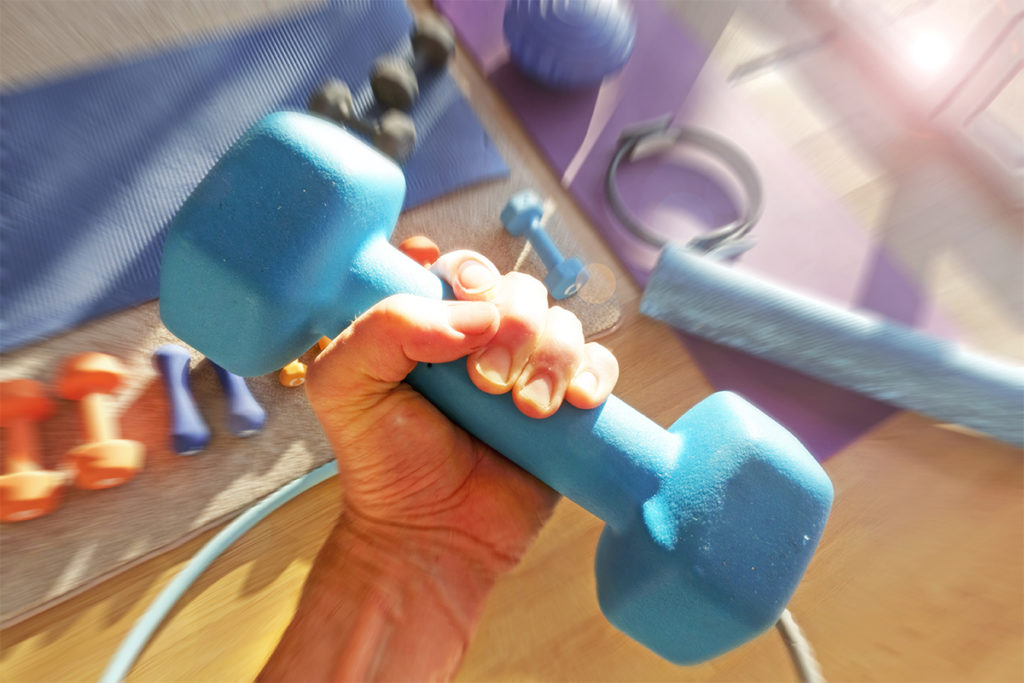Increasing Professionalism In and Out of the Studio, Part 1
Strengthening your resilience will keep you moving forward despite life's storms.

Whether you teach one indoor cycling class or provide individual training to 40 clients per week, as a fitness professional and business owner you are a leader in your community. Leaders inspire change in their clients, their colleagues, their employees and their community. By developing your leadership skills—regardless of your role in the fitness industry—you can inspire others to lead as well, and take action to improve the world around you.
This article is the first in a series on leadership development for fitness professionals. The series begins with a guide to resilience: the ability to focus on the needs of your clients even when you’re experiencing professional or personal struggles of your own. The second article will show the importance of truly living the life of a fitness professional—at the gym, online and at the grocery store. The series will then go on to address the value of developing relationships, tools for destressing and disconnecting, and techniques to help you safeguard your success and achieve work–life balance.
Break Down or Break Through
You just signed up two new clients for personal training, and you feel your day is off to a great start. Then one of your colleagues tells you she just got promoted to the position you had your eye on. Or maybe, despite the new clients, you’re struggling—because your relationship with your long-term partner ended last night.
Feeling overwhelmed or depressed is a normal response to bad news, but these feelings can become a distraction when you’re working with clients or interacting with club members. Your clients care about you, but your number-one priority is to provide a safe and effective workout for them. Successful fitness professionals know that they need to leave their personal life at the door, but how do you control your response to a personal challenge so you can provide a focused and productive training session?
Resilience Defined
In their online brochure “The Road to Resilience,” the American Psychological Association (APA 2012) defines resilience as “the process of adapting well in the face of adversity, trauma, tragedy, threats or other significant sources of stress.” The challenges can include relationship problems, health issues and financial stressors—to name just a few.
You achieve resilience by developing thoughts and actions that will help you adapt positively to negative experiences. According to the APA, resilience draws on factors you can find within yourself. Just a few examples:
- the capacity to make realistic plans and take steps to carry them out
- a positive view of yourself and confidence in you strengths and abilities
- skills in communication and problem solving
- the capacity to manage strong feelings and impulses
Building resilience is essential for your health and wellness, because an increase in external stressful events in daily life contributes to internal physical and emotional strain. If you don’t learn resilience, you risk negatively impacting your health. The Stanford neuroscientist Robert Sapolsky observes that “we’ve evolved to be smart enough to make ourselves sick” (Schwartz 2007). According to Sapolsky, who has spent more than three decades studying the physiological effects of stress on health, “Stress can increase your risk of adult onset diabetes and high blood pressure. This is a result of the release of adrenalin and other stress hormones; over time, it can have devastating consequences to your health.”
In The Stress Response (New Harbinger 2012), Christy Matta provides strategies to help you respond quickly to early signs of stress and enable you to change the catastrophic thoughts that make stress worse. You can also learn to accept unpleasant emotions and thoughts without judging them and to gradually decrease your vulnerability to stress.
“Although resilience is sometimes only evident in the face of a crisis, what is not obvious is that the noted strength develops from a mindset and lifestyle of self-care,” says Rebecca Merz, PhD, of the MindSpa Mental Fitness Center in Sarasota, Florida.
According to Merz, “While there may be general techniques or skills to learn, when a specific challenge arises, each individual’s motivation and experience of success is different.” Some of us are naturally able to bounce back when faced with stressful situations; the rest of us can certainly learn how to increase our resilience.
Boost your resilience with the following tips from the staff at the Mayo Clinic (2011):
- Build strong, positive relationships with family and friends, and lean on them for support.
- Set goals, and do something that gives you a sense of purpose every day.
- Think back to how you’ve coped with hardship in the past, and learn from your experience.
- Accept that you can’t change the past, but you can look toward the future.
- Exercise, eat well and get plenty of sleep.
- Tackle your problems instead of ignoring them.
Gain Support
Having a good support system is a significant component of resilience. Remember that your clients are not your support system. Having clients unload their stress on you is not an invitation for you to share your own stress with them. It’s your job to keep each session professional and focused on the client’s goals. The best way to maintain a professional relationship with your clients is to have other support resources, such as your friends, your family or a business coach. Maintaining good boundaries will also benefit your personal relationships.
“Separating my work life from my home life was initially a challenge, because I was so passionate about both,” says Nicki Anderson, 2009 IDEA Personal Trainer of the Year. “I soon realized that I was giving so much to my clients that I had little reserve for my family when I got home. I discovered that keeping my ‘fuel tank’ in check was vital to coming home, leaving work behind and looking forward to connecting with the most important part of my day, my family.”
If you’re not meeting your own needs, attempting to meet the needs of your clients may prove overwhelming. When you are out of balance, your ability to handle a crisis is likely to be compromised. Make your own health and wellness a priority by eating right and scheduling time for yourself; take a fitness class or work with your own personal trainer. A leadership coach or business coach can provide a safe and productive environment for you to unload your stress, while also giving you tools to boost your resilience. Visit www.noomii.com and find a coach in your area who can help you stay focused on both your personal needs and your professional goals.
Build Resilience to Become a Better Leader
Regardless of your initial thoughts when facing adversity, your challenge is to turn negative situations into positive ones. Although responding positively may not be innate for you, you can develop this response as you increase your self-awareness. When faced with a situation that requires resilience, take time to reflect. Make a list of what has worked for you in the past; identify your strengths and your sources of support. Most important, put into practice what you learn about yourself.
Next issue, we’ll explore how to maintain professionalism as you become more visible through social media.
SIDEBAR: 10 Ways to Build Resilience
- Make connections.
- Avoid seeing crises as insurmountable problems.
- Accept that change is part of living.
- Move toward your goals.
- Take decisive action.
- Look for opportunities for self-discovery.
- Nurture a positive view of yourself.
- Keep things in perspective.
- Maintain a hopeful outlook.
- Take care of yourself.
SIDEBAR: How Well Do You Cope With Stress?
Find out with this coping and stress management skills test from Psychology Today: http://psychologytoday.tests.psychtests.com/take_test.php?idRegTest=3200. This free online test provides you with a snapshot report; you can purchase the full test results for $4.95.
References
References
American Psychological Association. 2012. The road to resilience. www.apa.org/helpcenter/road-resilience.aspx#; retrieved July 15, 2012.
Matta, C. 2012. The Stress Response: How Dialectical Behavior Therapy Can Free You from Needless Anxiety, Worry, Anger, and Other Symptoms of Stress. Oakland, CA: New Harbinger Publications.
Mayo Clinic. 2011. Resilience: Build skills to endure hardship. www.mayoclinic.com/health/resilience/MH00078/NSECTIONGROUP=2; retrieved July 15, 2012.
Schwartz, M. 2007. Stanford Report: Robert Sapolsky discusses physiological effects of stress. http://news.stanford.edu/news/2007/march7/sapolskysr-030707.html; retrieved July 15, 2012.
Kristen Horler, MS
Kristen Horler is the CEO and founder of Baby Boot Camp, a fitness franchise for moms. Learn more at babybootcamp.com.




